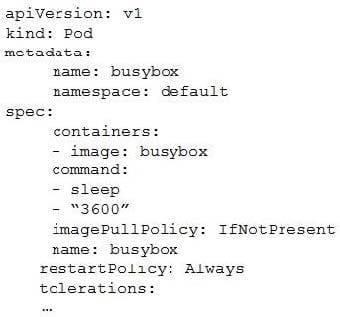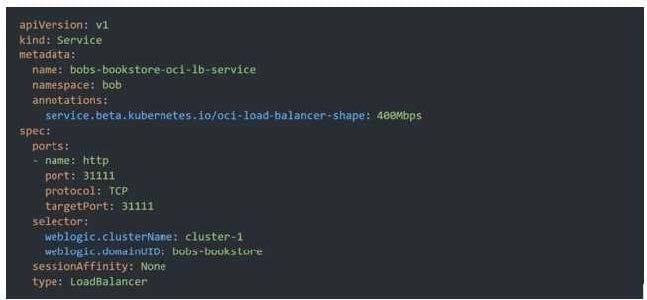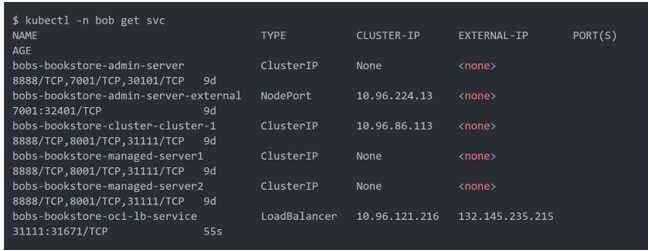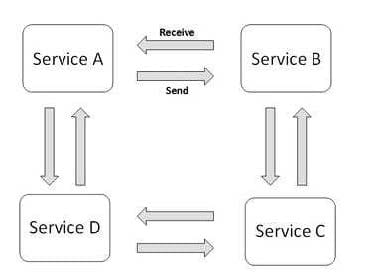1Z0-1084-20 Online Practice Questions and Answers
Which statement accurately describes Oracle Cloud Infrastructure (OCI) Load Balancer integration with OCI Container Engine for Kubernetes (OKE)?
A. OKE service provisions an OCI Load Balancer instance for each Kubernetes service with LoadBalancer type in the YAML configuration.
B. OCI Load Balancer instance provisioning is triggered by OCI Events service for each Kubernetes service with LoadBalancer type in the YAML configuration.
C. OCI Load Balancer instance must be manually provisioned for each Kubernetes service that requires traffic balancing.
D. OKE service provisions a single OCI Load Balancer instance shared with all the Kubernetes services with LoadBalancer type in the YAML configuration.
You have written a Node.js function and deployed it to Oracle Functions. Next, you need to call this
function from a microservice written in Java deployed on Oracle Cloud Infrastructure (OCI) Container
Engine for Kubernetes (OKE).
Which can help you to achieve this?
A. Use the OCI CLI with kubect1 to invoke the function from the microservice.
B. Oracle Functions does not allow a microservice deployed on OKE to invoke a function.
C. OKE does not allow a microservice to invoke a function from Oracle Functions.
D. Use the OCI Java SDK to invoke the function from the microservice.
Per CAP theorem, in which scenario do you NOT need to make any trade-off between the guarantees?
A. when there are no network partitions
B. when the system is running in the cloud
C. when the system is running on-premise
D. when you are using load balancers
Which two statements are true for service choreography?
A. Service choreographer is responsible for invoking other services.
B. Services involved in choreography communicate through messages/messaging systems.
C. Service choreography relies on a central coordinator.
D. Service choreography should not use events for communication.
E. Decision logic in service choreography is distributed.
Which is NOT a supported SDk Oracle Cloud Infrastructure (OCI)?
A. Go SDK
B. Java SDK
C. NET SDK
D. Ruby SDK
E. Python SDK
How can you find details of the tolerations field for the sample YAML file below?

A. kubectl list pod.spec.tolerations
B. kubectl explain pod.spec.tolerations
C. kubectl describe pod.spec tolerations
D. kubectl get pod.spec.tolerations
You are developing a serverless application with Oracle Functions and Oracle Cloud Infrastructure Object Storage- Your function needs to read a JSON file object from an Object Storage bucket named "inputbucket" in compartment "qa- compartment". Your corporate security standards mandate the use of Resource Principals for this use case. Which two statements are needed to implement this use case?
A. Set up a policy with the following statement to grant read access to the bucket:allow dynamic-group read-file-dg to read objects in compartment qa-compartment where target .bucket .name=' input-bucket *
B. Set up the following dynamic group for your function's OCID: Name: read-file-dg Rule: resource.id = `ocid1.fnfunc.oc1.phx.aaaaaaaakeaobctakezjz5i4ujj7g25q7sx5mvr55pms6f4da'
C. Set up a policy to grant all functions read access to the bucket:allow all functions in compartment qacompartment to read objects in target.bucket.name='input-bucket'
D. Set up a policy to grant your user account read access to the bucket:allow user XYZ to read objects in compartment qa-compartment where target .bucket, name-'input-bucket'
E. No policies are needed. By default, every function has read access to Object Storage buckets in the tenancy
In order to effectively test your cloud-native applications, you might utilize separate environments (development, testing, staging, production, etc.). Which Oracle Cloud Infrastructure (OC1) service can you use to create and manage your infrastructure?
A. OCI Compute
B. OCI Container Engine for Kubernetes
C. OCI Resource Manager
D. OCI API Gateway
Which one of the following is NOT a valid backend-type supported by Oracle Cloud Infrastructure (OCI) API Gateway?
A. STOCK_RESPONSE_BACKEND
B. ORACLE_FUNCTIONS_BACKEND
C. ORACLE_STREAMS_BACKEND
D. HTTP_BACKEND
Which pattern can help you minimize the probability of cascading failures in your system during partial loss of connectivity or a complete service failure?
A. Retry pattern
B. Anti-corruption layer pattern
C. Circuit breaker pattern
D. Compensating transaction pattern




